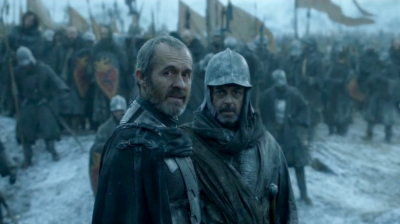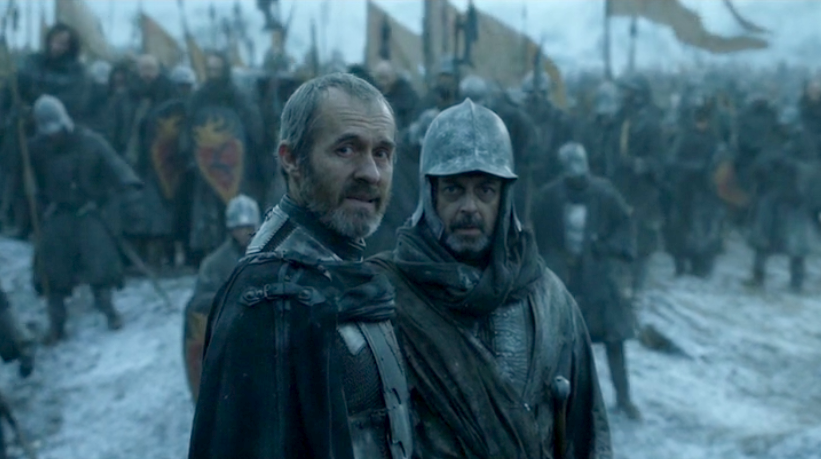 Spoilers Ahead!
Spoilers Ahead!
This review contains spoilers for Game Of Thrones Season 5, Episode 10 “Mother’s Mercy” (and Season 5 in general). Read at your own risk! This review has been written from the “newbie” perspective of someone has not read the Song of Ice and Fire books.
Much has been written about George R. R. Martin’s ability to subvert expectations. In Season 5, Martin and GoT showrunners David Benioff and D. B. Weiss put that to use by offering fans the appearance of payoffs regarding villains and heroes that ring disturbingly hollow. It’s not because the events unfold in an undramatic way, but that while the show delays a particular pièce de résistance it makes us start to care about other people and plotlines that are diametrically opposed to what we think we want to happen.
Prior to tonight’s episode, the best example of this phenomenon was finally (finally!) delivering a comeuppance to Queen Mother Cersei Lannister. That jerk has been responsible for the death and abuse of nearly every sympathetic character in Westeros (and some across the Narrow Sea). Watching Cersei be figuratively dressed down and imprisoned in a cell very much like poor Ned Stark’s should have been satisfying, and would have been, had it not meant eliminating the last fetter on a socially reactionary army of religious fanatics. Cersei was also the most straightforward hope of freeing the reasonably sympathetic Tyrell siblings.
But if even Cersei can’t escape the wrath of the Faith Militant cult that she herself armed, then what hope is there for the rest of King’s Landing? Those stakes escalated last night, as we saw Cersei stripped of all clothes and put through a stark naked “walk of shame” through jeering, filth-flinging crowds to her home at the Red Keep.
The scene’s direction, and actor Lena Headey’s resolute commitment, spare neither Cersei nor GoT viewers the horror of each step. Cersei herself is, initially, resolute in denying the small folk of the city the satisfaction of seeing her break down. But she falters after being subjected to everything she has ever loathed and feared about the “common people” – with men and women alike exposing themselves to her while verbal degradation, rotten food and excrement rain down from all sides.
But as Cersei agonizingly makes her way forward, the character takes on a martyr-like aura. It’s rich irony, since here the abusers are the devoted religious and Cersei is just trying to save her own skin, but Headey’s inner resolve and the Stations of The Cross-like staging places one of the story’s most irredeemable villains in an almost saintly light.
But just as the audience might begin to really connect to Cersei, she arrives at her palace full of armed guards. I half-expected her to whisper “Kill them all” to the first City Watch soldier she saw. But the payoff against the High Sparrow and his Faith Militant must wait another day, as we are introduced to the Cersei-loyalist, creepy-brilliant Qyburn’s latest achievement: the truly unnerving resurrection of the massive Gregor Clegane, AKA The Mountain. When Clegane scoops the vulnerable, spent Cersei into his arms it’s like a dystopian take on every fairy tale ending.
Last night’s episode actually began in The North, as Stannis Baratheon decamps for his assault on Winterfell. We find that Stannis’ wife, Selyse, has hanged herself in the night following the sacrifice of their daughter, the Princess Shireen, on a burning pyre. Again, pile of tainted payoffs. Selyse has been utterly unlikeable throughout the series. As brusque as Stannis, but full of performative self-loathing and even more reckless devotion to the Lady Melissandre’s prophesies. Selyse’s shame and treatment of the disfigured but irrepressible Shireen bordered on abuse, for her entire arc.
But at the culmination of Stannis and Selyse’s commitment to Melissandre’s vision of Stannis as a savior-king for the realms of men, Selyse finally becomes a mother and utterly breaks down at the sight and sound of her daughter’s burning alive in terror and agony. And what mother wouldn’t? Except this is the same woman who gleefully watched her relatives meet the same fate, marveling at how the smoke looked like “their souls leaving their bodies.” This is the same woman who expressed distaste for Shireen’s empathy toward Mance Rayder while he burned at the stake.
As viewers, we can take no pleasure in the insufferable Selyse’s end, because it came at the expense of a sweet little girl’s life and arrived just as Selyse began demonstrating achingly human emotion and a capacity for loss.
And Stannis just keeps losing. His mercenaries fled in the night, taking the horses, and the Lady Melissandre flees just as Stannis discovers his wife’s body (to say that abandonment was a big theme, last night, is a massive understatement). But Stannis, for good or ill, is relentlessly Stannis and he moves forward with his siege on one of Westeros’ greatest strongholds.
But the siege is canceled in lieu of a route from the amassed cavalry of the Boltons, their bannermen and maybe some of the mercenaries who fled in the night? In any case, it’s a lot of cavalry. And they cut through Stannis’ exhausted, frozen infantry much in the same way Stannis cut down the Wildlings outside of the Wall.
And this sets off our third tainted payoff of the episode. The warrior Lady Brienne of Tarth finds a wounded Stannis, who she knows is responsible for the murder of rival king Renly (Stannis’ younger brother) who she loved and swore protect. Brienne is one of the strongest, most virtuous and formidable characters on the show, and has been frustrated from fulfilling her duties at every turn. But Brienne avenging her king means the final blow against Stannis, who is an undeniably tragic figure. We do not, however, see Stannis’ corpse, and on a show that rarely hesitates to show that kind of thing it might mean the man might yet live.
Also, Brienne’s avenging Renly meant abandoning her vigil to assist Sansa Stark just at the moment Sansa makes a bid for escape. But Reek (née Theon Greyjoy) pays back a tiny bit of his huge karma debt to the Starks by saving Sansa from maiming and recapture. When Sansa and Reek join hands to leap over the castle walls into (hopefully!) a snowbank below, we can’t help but hold some hope for them, though their trials are not likely over.
But the watch of Sansa’s brother, Jon Snow, seemingly has ended — at the hands of his comrades. Jon’s last true confident at Castle Black, Samwell Tarly, departs with his Wildling love Gilly and baby Sam to Oldtow,n to begin his studies as a maester. When Jon learns that Sam and Gilly have made love, fulfilling Sam’s arguably biggest wish in life even above becoming a maester and helping to save the world, Jon replies “I’m glad the end of the world is working out well for someone.” It’s a funny line in the moment, but it hangs over the rest of the episode, with the emphasis on someone (i.e. everyone else is screwed).
Jon, like many GoT heroes, has done nearly everything “right” and made the “hard choices” that would be rewarded in most epic stories — and for his troubles he is repaid with murder and tragedy. Had he compromised his integrity and enlisted himself (and/or the Wildlings, and/or the men of the Night’s Watch) in the fight against the Boltons,- would the Princess Shireen still be alive? Would Stannis be yet unbroken? Would Jon have saved Sansa and ruled Winterfell justly as Lord Stark? Maybe or maybe not, but it’s a good bet he would not have been stabbed to death in the night by his own men and young ward/steward, Olly.
But that’s where we leave Jon, bleeding out into the snow, having been left by a mutiny orchestrated by the sneering Lord Alliser Thorne. But if I’m being honest, I suspected Jon was marked for death the moment he executed Lord Janos Slynt. Every Stark who has carried out an execution has been betrayed and murdered by season’s end. I hoped things would be different for Jon, and I may yet be right. In the final moments of the episode, Jon’s eyes seem to lighten in color. Is he becoming a wight? Or a White Walker? Or “warg-ing” his consciousness into his wolf, Ghost, as readers of the books have suggested? Or will Melissandre, who arrived at Castle Black after abandoning Stannis, resurrect Jon as her fellow Red God-devotee Thoros of Myr has done so many times for Lord Beric Dondarrion?
It will be a long wait until next season to find out.
The last Stark to recap here is Arya, yet another case study in frustrated payoffs. She exacts revenge on Ser Meryn Trant, abuser of multiple Stark girls and young girls in general. As the scene opens we find Trant indulging his predilection for beating child prostitutes, with one girl refusing to cry out through her shroud of hair. We expect the hair to part and reveal Arya’s face, and when a different face is unveiled we have but moments before the double-reveal that Arya has used one of the House of Black and White’s mystical disguises to gain access to Trant.
Arya’s assassination of Trant is visceral and her satisfaction infectious. But the triumph is short-lived as, of course, the House of Black and White discovers that she has performed an unauthorized “hit” and betrayed her training and their trust. Arya seems to avoid execution via poisoning, but finds out that her use of one of their masks without proper training is poison enough, and Arya goes blind.
Blind! And that’s why we can’t have nice things. But the genius of Game of Thrones is that it never quite lurches into nihilism. As in life, there is just enough seeming purpose and progress to keep us engaged. Just don’t expect a reward for your efforts.
I’ll say this, however, about Myrcella Baratheon dying in Jaime Lannister’s arms just as she admitted knowing that he’s her father and that she loves him despite being the product of incest: that was just damn cruel. And I can’t believe that’s a thing that happened on a major television franchise.
